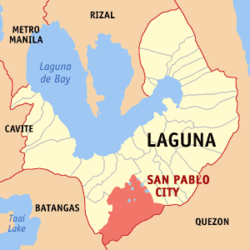San Pablo City, Laguna
| San Pablo City | ||
|---|---|---|
| City | ||

Jose Rizal Avenue
|
||
|
||
| Nickname(s): City of Seven Lakes | ||
 Map of Laguna showing the location of San Pablo |
||
| Location within the Philippines | ||
| Coordinates: 14°04′N 121°19′E / 14.07°N 121.32°ECoordinates: 14°04′N 121°19′E / 14.07°N 121.32°E | ||
| Country | Philippines | |
| Region | CALABARZON (Region IV-A) | |
| Province | Laguna | |
| District | 3rd district of Laguna | |
| Incorporated | 1586 (parish) | |
| Incorporated | 1647 (municipality) | |
| Cityhood | May 7, 1940 | |
| Barangays | 80 | |
| Government | ||
| • Mayor | Loreto S. Amante (UNA) | |
| • Vice Mayor | Angelita E. Yang (UNA) | |
| Area | ||
| • Total | 197.56 km2 (76.28 sq mi) | |
| Elevation | 101 m (331 ft) | |
| Population (2015 census) | ||
| • Total | 266,068 | |
| • Density | 1,300/km2 (3,500/sq mi) | |
| Demonym(s) | San Pablense / San Pableño | |
| Time zone | PST (UTC+8) | |
| ZIP code | 4000 | |
| IDD : area code | +63 (0)49 | |
| Electorate | 131,815 voters as of 2016 | |
| Languages | Filipino, English | |
| Abbreviation(s) | SPC | |
| Website | www |
|
San Pablo City is a first class city in the southern portion of Laguna province, Philippines, and is one of the country's oldest cities. By land area, it is the largest in the province of Laguna. With a population of 266,068 people in the 2015 census, it ranks sixth within the province after the cities of Calamba, Santa Rosa, Biñan, San Pedro, and Cabuyao.
The city is more popularly known as the "City of Seven Lakes" (Tagalog: Lungsod ng Pitong Lawa), referring to the Seven Lakes of San Pablo: Lake Sampaloc (or Sampalok), Lake Palakpakin, Lake Bunot, Lakes Pandin and Yambo, Lake Muhikap, and Lake Calibato.
San Pablo was part of the Roman Catholic Archdiocese of Lipa since 1910. On November 28, 1967, it became an independent diocese and became the Roman Catholic Diocese of San Pablo.
San Pablo's earliest historical record dates back to pre-Spanish times when four large barrios bounded by Mount Makiling composed "Sampalok" .And one of the richest cities in the Philippines. In 1571, the first Spanish troops under Captain Juan de Salcedo arrived in the upland village of Sampaloc, which became a parish in 1586, and then a municipality in 1647, and was renamed "San Pablo de Los Montes" in honor of Saint Paul the First Hermit. In 1756 it was placed under the jurisdiction of Batangas province but was returned in 1883 to Laguna.
...
Wikipedia


